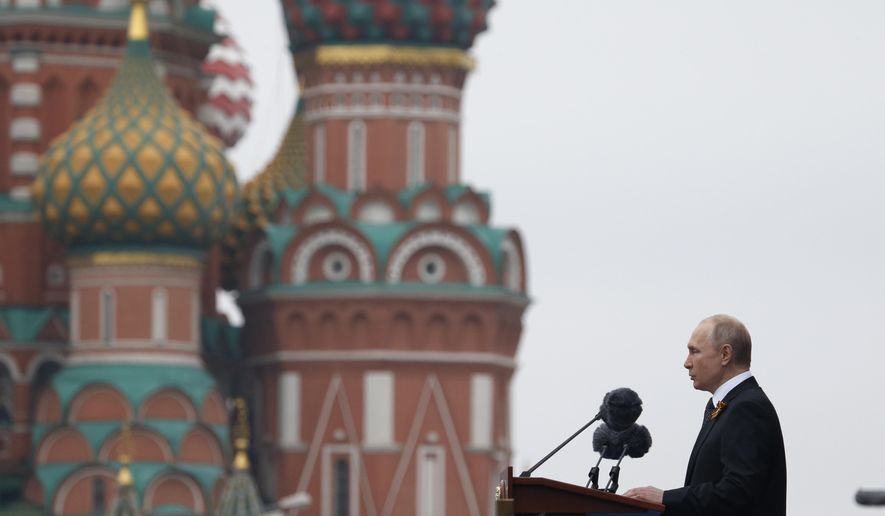Russia tested an anti-satellite weapon in space earlier this month, the U.S. Space Command said Thursday.
U.S. military monitors described the on-orbit test as a “nondestructive” test of a space-based anti-satellite weapon, known as an ASAT, that was carried out July 15.
The ASAT was launched from a satellite known as Cosmos 2542, the command said in a statement, noting it had expressed previous concerns about the Russian system already once this year.
“The Russian satellite system used to conduct this on-orbit weapons test is the same satellite system that we raised concerns about earlier this year, when Russia maneuvered near a U.S. government satellite,” said Air Force Gen. John W. “Jay” Raymond, commander of U.S. Space Command and U.S. Space Force chief of space operations.
British Air Vice Marshal Harvey Smyth, head of the U.K.’s space directorate, echoed the U.S. charges, saying the Russian system tested had the “characteristics of a weapon.”
In April, Russia conducted a test of a direct-ascent ASAT missile designed to destroy satellites in low-earth orbit.
In Moscow, the Russian Defense Ministry the “small space vehicle” tested in the July 15 event was merely “inspecting” one of the country’s satellites “from a close distance using special equipment,” The Associated Press reported. U.S. officials, however, said the data were inconsistent with the stated mission of an inspector satellite.
The White House revealed that President Trump spoke by phone with Russian President Vladimir Putin on Thursday about arms control and economic recovery efforts from the coronavirus pandemic. Neither side said the satellite test — or recent reports of Russian bounties to Afghan Taliban fighters to kill U.S. troops — had come up during the call, saying only that Mr. Trump and Mr. Putin discussed “critical bilateral and global issues.”
On arms control, the White House said Mr. Trump “reiterated his hope of avoiding an expensive three-way arms race between China, Russia, and the United States and looked forward to progress on upcoming arms control negotiations in Vienna.”
Russian officials said the two leaders also discusses trade and the state of Iran’s nuclear programs. Moscow has balked at the U.S. push to include China in the talks on the soon-expiring New START arms control agreement.
Gen. Raymond called the ASAT test “further evidence of Russia’s continuing efforts to develop and test space-based systems, and consistent with the Kremlin’s published military doctrine to employ weapons that hold U.S. and allied space assets at risk.”
In 2018, the State Department raised concerns about Russian space weapons activity, noting that maneuvering satellites shared the characteristics of space-based weapons.
At the State Department, acting Undersecretary of State for Arms Control and International Security Chris Ford said the test highlights what he called Moscow’s duplicity in seeking space arms control.
“This event highlights Russia’s hypocritical advocacy of outer space arms control, with which Moscow aims to restrict the capabilities of the United States while clearly having no intention of halting its own counterspace program — both ground-based anti-satellite capabilities and what would appear to be actual in-orbit anti-satellite weaponry,” Mr. Ford said.
The Space Command said the test highlights the threats to U.S. and allied space systems. The dangers are “real, serious, and increasing,” the command said.
Russia and China are both said to be developing several types of space weapons, including ground-launched ASAT weapons; maneuvering robot satellites capable of crushing or grabbing orbiting satellites; and ground-based lasers that can damage or destroy satellites.
“The United States, in coordination with our allies, is ready and committed to deterring aggression and defending the nation, our allies and vital U.S. interests from hostile acts in space,” Gen. Raymond said.
The Russian test of a DA-ASAT missile April 15 followed on-orbit testing in February of two satellites, the Cosmos 2542 and Cosmos 2543, that were described by Space Command as space weapons that conducted maneuvers near U.S. satellites. The command said those tests were “interpreted as irresponsible and potentially threatening in any other domain.”
⦁ Dave Boyer contributed to this report.
• Bill Gertz can be reached at bgertz@washingtontimes.com.




Please read our comment policy before commenting.